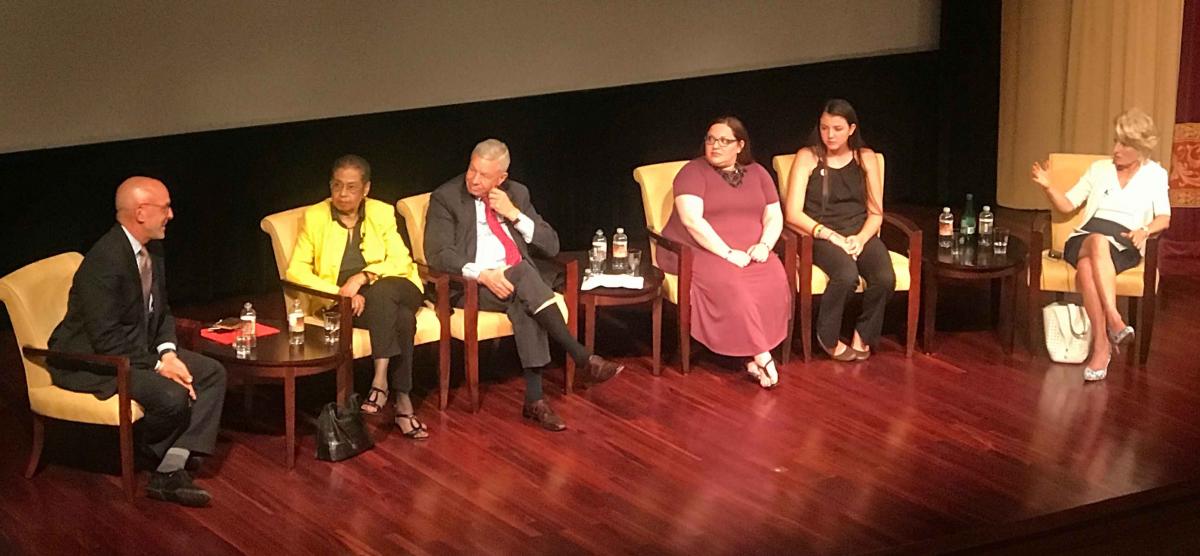
Panel Examines Citizen Engagement Throughout U.S. History
By Kerri Lawrence | National Archives News
WASHINGTON, June 29, 2018 — From the nation’s founding and the abolitionist movement to the civil rights marches in the 1960s and student activism in the social media age, citizen engagement has played a critical role in shaping our nation’s history. The National Archives recently hosted a cross-generational, bipartisan discussion on how citizen movements have influenced—or failed to influence—policymakers in the United States.
“Citizen engagement and civic literacy have long been woven into the work we do here at the National Archives,” said Archivist of the United States David S. Ferriero during opening remarks for “Citizen Engagement in America’s History,” a public program held June 20, 2018, at the National Archives in Washington, DC, in partnership with the U.S. Association of Former Members of Congress.
Former Congresswoman Jane Harman of California moderated the panel, which included former and current members of Congress, along with a student activist and her teacher, engaging them in discussions about their roles as activists and/or influencers.
“Activists founded our country and wrote the founding documents, many of which are in this building” Harman said. “We wouldn’t have a country without activism.”
Longtime civil rights activist and District of Columbia Delegate Eleanor Holmes Norton shared her views about the positive way the youngest members of our society have influenced critical social decisions within our nation—including civil rights, women’s rights, and more recently, gun safety.
“Young people...are showing that there is a general understanding in this society that nothing happens without activism,” Holmes Norton said. “That is the most important element of a democracy—that you think that what you are doing can somehow affect a very large issue.”
 High school student Rain Valladares shared her recent experience as a young activist who was thrust into the media spotlight. Valladares is a student at Marjory Stoneman Douglas High School in Parkland, Florida, where a classmate fatally shot 14 students and 3 staff members and wounded 17 others on February 14, 2018. The shooting was one of the deadliest school massacres in the United States.
High school student Rain Valladares shared her recent experience as a young activist who was thrust into the media spotlight. Valladares is a student at Marjory Stoneman Douglas High School in Parkland, Florida, where a classmate fatally shot 14 students and 3 staff members and wounded 17 others on February 14, 2018. The shooting was one of the deadliest school massacres in the United States.
“There’s...many different ways to be an activist—tweet, speak out, art,” Valladares said. “And I used my art, my craft, my photography as my way to protest.” She shared how she had posted photos from Valentine’s Day activities she had taken the same day of the shooting at the school.
“It got a lot of attention on Twitter, and people realized [through the photos] the innocence that we had...and how it was just ripped away from us,” she said. “I always compare that event to...a huge before and after in my life, and those photos were the last account of my before.”
Sarah Lerner, an English and journalism teacher at Marjory Stoneman Douglas High School, recounted the events of the horrific day at the school. She shared how she felt a sense of responsibility to her students and her community to react in the days following the tragedy.
“I’ve always been very politically aware and politically active in my own right,” she said. “I’ve been very active on Twitter for years...but I knew that a handful of people who were following me...were seeing what I was saying and I didn’t take that responsibility lightly,” she said.
Lerner went on to say later in the discussion how proud she was of her students’ advocacy and the maturity and poise they demonstrated following the tragedy. “To see them have a voice, to see them have this platform, knowing that we as their teachers support them and encourage them,” Lerner said.
Congressman Tom Deutch of Florida shared similar praise for the young activists, telling of meeting many of them for the first time at a local vigil just 24 hours after the tragedy.
“The reason they have been so incredible and so inspiring...there is nothing more happening here than people who experienced something that is just incomprehensible to the rest of us and decided to do something about it in the most genuine way,” Deutch said. “The reason that they are so successful is because they are so real.”
He added, “There is no better advocate than someone who comes with a personal story,” he said, “and there is no more powerful personal story than the stories we are hearing out of Parkland.”
Tom Petri, a former member of Congress from Wisconsin, commented, “We are very fortunate in this country that we do have the right to petition the government and the freedom of association.”
The entire program is available on the National Archives YouTube channel.